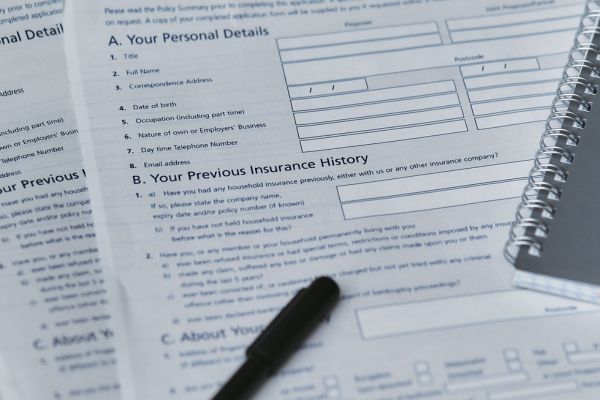Getting your Utah insurance license is the first step to becoming an insurance agent in Utah. Whether you’re interested in selling property and casualty insurance, life insurance, health insurance, or any combination of those lines of authority, this article has the information you need to get started.
How To Become An Insurance Agent In Utah
The Utah Insurance Department has a 6-step process for becoming a Utah insurance agent. We’ll take you step by step through the process, from license application to insurance test prep to the Utah insurance exam and beyond.
Step 1: What Insurance Licenses Do You Require?
The first step in obtaining your insurance license is determining which licenses you require. The most common licenses obtained by new insurance agents are the property and casualty (P&C) and life and health insurance (L&H).
Which licenses you’ll need will depend on the types of insurance products and policies you’ll be selling. Here are some examples of policies that can be marketed with each license:
Property and Casualty Insurance License – Auto Insurance, Home Insurance, Commercial Insurance.
License for Life and Health Insurance – Life Insurance, Annuities, Medicare, Health Insurance.
Most insurance agents and producers obtain both P&C and L&H licenses, but if you intend to specialize in only one area, you do not need all of them.
Step 2: Utah Insurance Pre-Exam Training
After determining which licenses you require, you can begin studying for the Utah insurance exams.
Utah does not require you to complete a certain number of pre-license credits before taking the exam. This means that you are entirely responsible for studying for your exam.
The majority of people opt to take an insurance pre-license course online. These courses are designed specifically to provide you with the skills required to pass the exam. Others prepare by purchasing books or other self-study materials.
It’s a good idea to devote a week or so to studying for this exam. Take a little longer if you don’t feel like you’re a strong test taker, but don’t let it drag on too long. We want you to pass your exam the first time, and we know you can do it.
Step 3: Take the Utah Insurance License Exam
After completing all of your pre-license coursework or self-study, the next step is to take the insurance exam. You will need to take one exam for each combined line of insurance that you want to carry.
This is a proctored exam, so you will be in a controlled environment with someone watching over you. People who have never tested in this situation should be aware of this fact and work on calming their nerves before taking the exam.
The fee for each attempt of the exams is as follows:
- Life & Accident & Health: $44
- Property & Casualty: $44
- Life: $32
- Accident and Health: $32
- Property: $32
- Casualty: $32
When you show up you must have a photo ID any other documents that the testing facility has asked you to bring.
The minimum score to pass each test is 70% correct answers.
For much more information on the exams, reference the Prometric Exams Utah Insurance Examinations Candidate Information Bulletin.
Prometric provides content outlines for each exam. Be sure to study them before you attempt the test:
- Utah Life Insurance Exam Content Outline
- Utah Accident and Health Insurance License Exam Content Outline
- Utah Life, Accident and Health Insurance License Exam Content Outline
- Utah Property and Casualty Insurance License Exam Content Outline
- Utah Property Insurance License Exam Content Outline
- Utah Casualty Insurance License Exam Content Outline
Step 4. Utah Insurance License Application
Immediately after passing the exam, you can now apply for your license.
We highly recommend that you use the kiosk at the test center to submit your license application via Sircon. The license application will include an FBI/BCI fingerprint fee of $28.25 ($13.25 FBI/$15.00 BCI).
If you have more than one line of authority that you have passed the exam for, be sure to apply for all of those lines.
The fee for an online application is $75. If you wish to add a line of authority to your license at a later date, there is a $25 amendment fee.
Step 5: Fingerprinting and Background Investigation
Prior to licensing, the state of Utah requires all insurance license applicants to provide fingerprints. A background check will be initiated if you provide your fingerprints. If you have a history of misdemeanors or felonies, it may affect the outcome of your licensing application. For more information, contact the Department of Insurance at (801) 538-3855 or send an email to the Insurance Department.
After completing your online license application, print your Sircon confirmation page to show to the test center supervisor as proof that you have paid the FBI/BCI fees in order to be fingerprinted.
Fingerprinting costs a total of $34.25. This covers the FBI/BCI fee of $28.25 as well as the $6 Prometric fingerprinting processing fee. When the documents are finished, they will be automatically forwarded to the licensing department.
Step 6. Application Review
Once you have submitted your application and have filled all the other requirements, your license application will be reviewed by the state. Your background check initiated by the application will also be reviewed.
If everything is to acceptable standards your license should be issued quickly. If there are any items from your background check that need to be reviewed, it may slow down the process of issuance. If this is the case, the state may contact you to provide context to the issues that they have run into.
After submitting your application, the review process should take between five and ten (5-10) business days. After it is complete, you will receive an email from the licensing department with verification that your license has been issued.
Conclusion
Becoming an insurance agent in Utah is a journey that requires dedication, continuous learning, and a commitment to ethical standards. By navigating the state-specific requirements, gaining relevant experience, and embracing the dynamic nature of the industry, you can build a fulfilling and prosperous career in insurance.
FAQs
1. If I add a line of authority to an existing license, does it change my expiration date?
No. Adding a line of authority is not adding an additional license. You are amending an existing license; therefore the expiration date does not change.
2. I want to license my agency. Do I have to keep my individual license? Why do I need both?
Yes, because an agency may only operate through a licensed natural person. In order for an agency to function, it must have a licensed individual to act on behalf of the agency.
3. Is an appointment with an insurer or designation with an agency required in order to obtain/ hold a license?
No. Appointments and designations are not required to obtain or maintain an insurance license. However, an individual producer may not act as an agent in soliciting, negotiating or binding insurance without either an appointment with an insurer in order to represent or do business for the insurer directly, or a designation to an agency that is appointed to an insurer in order to represent or do business for the agency.
4. Can an agency license remain active if there are no licensed individuals designated to that license?
The agency license may remain active, but the agency may not operate (sell, solicit, or negotiate) unless a licensed individual is designated to the agency.
5. Can I become an insurance agent in Utah with a criminal record?
Having a criminal record may pose challenges, but it’s essential to check with the Utah Insurance Department for specific eligibility criteria.






